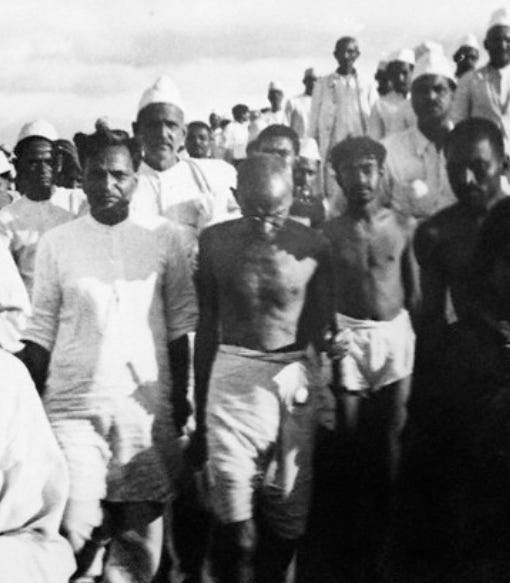In 1930, Gandhi announced that on March 12, he and 78 participants would set off for the sea to violate the British monopoly on salt. “Those joining the march,” he wrote, “should all be on the spot at 6:20.” Be there ten minutes early. Good advice.

Although the exact route and destination were kept secret, they would end up walking 241 miles before reaching the Arabian Sea. The 60-year-old Gandhi explained to a reporter, “I have had no practice for some time in long-distance walking.” In his younger days, he’d covered as many as 50 miles in one day.
In a longer speech that afternoon, Gandhi spoke passionately of the need to establish a government that was driven by service to the people. “There are two ways of establishing such a government: that of the big stick or violence and that of nonviolence or civil disobedience,” he said. “We have chosen the second alternative, regarding it as our dharma (duty).”
In hindsight, we know the march succeeded, and the tens of thousands arrested forced the British to negotiate with Gandhi as an equal just to end the civil disobedience. But reading his letters and speeches at the time, he was expecting to be arrested, as he had been eight years earlier. Once again, he’d even published an article “When I Am Arrested.” And yet, it didn’t happen. He marched all the way to the sea, right on schedule, timing his arrival to commemorate the anniversary of the first national day of fasting in 1919. Gandhi was a punctual guy.
In the United States today, there is also a strong desire to reform the government. The American Union model offers a way to do so in 2024 using nonviolence. Rather than asking people to court arrest, the fast for peace asks them to give up food for 24 hours, just drinking water. This is a fast of moral pressure.
It takes place on the 15th of each month; March 15, April 15, May 15, through October 15—three weeks before the general election. Then, the government will have to decide; serve the people by promptly enacting our legislative demands or face civil disobedience in the ballot box.
By offering a constructive and face-saving alternative to adversarial politics, what looks to be a hateful, polarizing election cycle can be redirected by a community of people working toward a peaceful solution. This builds a new system of collaborative democracy—a government that serves the people because they hold the reins of power.
Add your pledge for March 15 at https://fastforpeace.org/pledge and join the nonviolent revolution!
Today’s discussion question: What event have you worried about, only it never ended up happening?


